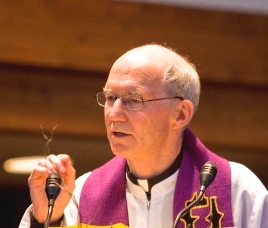This Lent I am giving you something I hope you will treasure and put to good use: the Case for Jesus by Brant Pitre. Last week we saw how Dr. Pitre defends the reliability of the Gospels and their superiority to the so-called Lost Gospels. I'd read them when I was back in the seminary. They have some interesting parts but, really, there's no comparison between them and Matthew, Mark, Luke & John.
What Dr. Pitre does in Case for Jesus is to present Jesus in his Jewish context. For example, today we hear Jesus say, "Destroy this Temple and in three days I will rebuild it." Dr Pitre explains what the temple means for a Jewish person of the first century. In the Jewish context you can see how Jesus' talk about the Temple shows his claim to divinity - that he is consubstantial with the Father.
Dr. Pitre then describes something I never thought about: What happens to the blood of all the lambs sacrificed in the Jewish Temple? Well, it turns out the Temple had a drainage system that merged the lambs' blood with water from the spring on Mount Zion. Blood and water literally flowed from the side of the Temple. (read Case for Jesus, pp. 168-172, for details) We'll hear more about blood and water on Good Friday. Stay tuned.
Besides the blood and water there's something more about the Temple that we can see in relation to today's first reading. When Solomon built the original Temple about a thousand years before Jesus, it had an area called the Holy of Holies which housed the Ark of the Covenant. The Ark contained three objects: the manna, that is, the bread from heaven; the staff of the priest Aaron (Moses' older brother) and the tablets of the Ten Commandments.
For Jewish people the Ten Commandments - the Law - was more than a list of things to do and not to do. The Law is God's great gift leading to freedom. As we heard today, the first commandment says, "I the Lord am your God who brought you out of Egypt, that place of slavery."
Slavery is a horrible part of human history and it continues today - human trafficking. God hates it because no human being has the right to own another human. But there is something worse than physical slavery. A person can abuse his freedom, destroy himself and others. We all know people who have become slaves to alcohol, drugs, porn, gambling. You name it. There are other more hidden forms of slavery. God - in Jesus - wants to bring us out of Egypt, that place of slavery.
In Finding Hope When Life Hurts, Fr. Sica describes the importance of being able to say "no" so that we can say "yes" to what really matters. As we saw on the First Sunday of Lent, we need to say "no" to the devil, all the ways he wants to deceive and enslave us - and destroy relationships.
Well, this Sunday we have a special prayer against the Evil One. It's called the First Scrutiny - an exorcism prayer for candidates for Confirmation and Easter Sacraments. Don't worry, this exorcism prayer does not mean you are possessed by the devil, but you do need help against his attacks. The First Scrutiny is based on Jesus conversation with the Samaritan woman - the Woman at the Well seeking living water.
Jesus is the Living Water who fills our deepest thirst. Jesus is the true temple: the blood and water flowing from Jesus cleanse us and free us from slavery to Satan. Jesus wants us to have a new life: "Lord you have the words of eternal life." Amen.

 RSS Feed
RSS Feed
